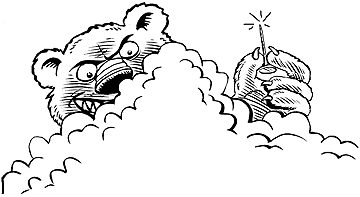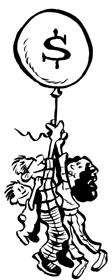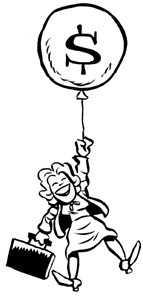|
December 12 , 1999 After
the Fall The
First Stone Raucous
Caucasus The Kremlin bombards Chechnya Past
His Prime Getting
Schooled Mumia's
Last Chance
No
Small Thing Editorial Appall-O-Meter A Terry Laban Cartoon Kosovo
Cleansed The
Party's Over Teamsters
Test Profile
Press
Pass No
Exit Tunnel
Visions Smoke
in Your Eyes |
After the Fall
The stock market will crash.
Then what?
 |
|
Ilustrations by Terry LaBan
|
By Dean Baker
Trying to build momentum for a progressive agenda can be difficult when finding the next big Internet stock has become an obsession for millions. Even though the extent of stock ownership is greatly exaggerated (only about half of families hold any stock at all, including indirect holdings through mutual funds), the impact of the bull market on society is not. Soaring stock prices quite literally have transformed many middle-income workers into paper millionaires overnight. The stock options available to the professional employees, and sometimes even lower level workers, at firms like Microsoft, Dell or Amazon.com, can be worth millions at current stock prices. This has created an obsession with the idea that everyone can get rich if they just find the right train to ride.
 |
But the stock obsession goes beyond the high-flying Internet companies. It has infected all areas of public debate. The difference between President Clinton and the Republicans on Social Security, for example, can be viewed as how best to cash in on high stock returns. While the president wants to place Social Security funds directly in the stock market, the Republicans propose to do it through individual accounts.
More generally, the roaring stock market is seen as a testament to the success of American-style, free-market capitalism. The stock market apostles want to get the government out of the way and let business run the show. This gospel is being applied in all areas of life, from schools and prisons to health care. It also has become a leading export item, as the administration tries to push the American model on Japan, Europe and the rest of world, with the strong arm of the IMF acting as a sales agent in the less-developed countries.
There is a major problem with this picture. By any reasonable measure, the stock market is hugely overvalued. Typically the ratio of the price of a share of stock to the earnings per share has been about 14 to 1. Currently it is more than 30 to 1. Investors can bid up stock prices in the same way they can bid up prices of rare paintings. But ultimately people value shares based on the earnings they generate, not how pretty they are. This means that stock prices would have to fall 50 to 70 percent to allow stocks to offer a return that is competitive with other financial assets, such as bonds.
Furthermore, when the stock market crashes it is not going to bounce back like it did in 1987, when the market wasn't nearly as overvalued. After the fall, stock prices are likely to grow at about the same rate as the economy, around 2 percent annually after adjusting for inflation. This is an issue of logic and arithmetic, not ideology. To put it simply, stock prices must be based on profits, and the expected growth of profits. Even the highest plausible assumptions about profit growth would still leave the current market overvalued by about 50 percent. There is no economist in the country who has been able to develop a scenario that would justify current stock prices.
Stock prices will plunge - it's just a question of when. Prices are determined by the psychology of investors. Their enthusiasm for stocks, no matter how irrational, may keep prices at inflated levels for six months, two years, even a decade. Economics and logic can't predict exactly when reality will catch up with this enthusiasm: They only assure that at some point it will.
Although the day of reckoning may be many years in the future, it is still worth thinking about what the post-crash world will look like. Most immediately, a large number of people will suddenly be far poorer. A 50 percent decline in the stock market will destroy more than $7 trillion worth of paper wealth. Some of the losers will be the Internet billionaires and other high flyers who richly deserve their fate. But most of the losers will be middle-income workers who were relying on the stock market to provide their retirement income.
The fallout from the crash will also hit institutional investors. Major corporations with defined benefit pension plans, like General Motors or Boeing, will suddenly have large deficits to make up. This will mostly be taken out of corporate profits, but they will try to get what they can out of workers' wages. Most unions also have defined benefit pension plans for their own workers. A plunge in the stock market could seriously set back their finances. And charitable foundations, some of which finance progressive activity, will have far less money to give out. If half of their endowments are in stock and the market falls by 50 percent, there could be a reduction of 25 percent in the amount of grants provided by these institutions.
A crash will also throw the economy into a tailspin. Currently the economy is being propelled by a stock-market-driven consumption boom. As people see the value of their stock portfolios rise, they go out and spend money. They are spending so much that the savings rate has actually turned negative in the last year, with people almost outspending their entire income. A stock crash will throw this pattern into reverse. As people watch the value of their stock portfolios shrivel, they will cut back their spending to try to rebuild their savings. This will lead to a large falloff in demand and almost certainly to a recession. A recession would likely raise the unemployment rate by at least 2 to 3 percent. Following historic patterns, this would mean an increase in the unemployment rate among African-Americans of 4 to 6 percent.
This new economic environment will require an entirely different political agenda. Millions of people will be desperate and angry. It will be important to be prepared to move forward with policies that address people's immediate needs and also set the path for an economic recovery on a more solid foundation. In the post-crash world, progressive ideas now seen as untenable suddenly will appear both reasonable and necessary.
 |
For beginners, the nation will have to end its fixation on balanced budgets and paying off the national debt. The number zero is only important to numerologists; it doesn't matter to the economy. Standard economic models show very little benefit from budget surpluses or paying down the national debt. In the post-crash world, it is essential that the government be prepared to use the stimulus from large deficits to maintain demand in the economy. In other words, additional spending by the government can offset reduced spending by the private sector to sustain demand in the economy and maintain higher levels of employment. Ideally, deficit spending could be used to address some of the nation's unmet needs, such as providing health care to the uninsured or improving the quality of education in the inner cities. If Congress insisted on balancing the budget in such an environment, or worse, paying down the debt, it would guarantee that the post-crash recession would be long and harsh.
But this is only the start. The crash of the stock market is the ideological equivalent of the fall of the Berlin Wall. The soaring market has allowed corporate ideology to dominate public debate as never before. In the wake of the crash, progressives should be prepared to propose clear alternatives to a failed worldview.
Some parts of the agenda are obvious. It will be time to clean up Wall Street. The simplest way to try to deter similar bouts of "irrational exuberance" in the future is to impose a small transactions tax on the exchange of stocks, options, currencies and other financial instruments used for speculation. A tax of 0.25 percent on each purchase or sale of a share of stock would have almost no impact on anyone who holds a stock for five or 10 years, but it could prove quite costly to someone who buys at two o'clock and sells an hour later. Similarly, a tax of 0.1 percent on currency trades, such as buying Japanese yen, won't affect the price of imported cars in any noticeable way, but it would make high speed currency shuffling very expensive.
This sort of transaction tax would not necessarily prevent future bubbles, but it would at least treat this form of gambling like any other form, all of which are heavily taxed. There is no reason to prefer that gamblers place their bets in financial markets rather than casinos, horse tracks or state lotteries. In addition, the tax could raise more than $100 billion annually. This money could be used to finance social spending and/or a tax cut for low- and middle-income workers.
 |
But the need for rethinking the nation's agenda goes much further. Over the past two decades, the nation's leading economists have told us (and the rest of the world, through institutions like the IMF and World Bank) that the financial markets should be given full responsibility for allocating capital. They claimed that governments were too incompetent and would inevitably get things wrong. But the current overvaluation of the stock market shows that the market can lead to misallocations that can outdo even the most inept government bureaucracies.
Consider the case of an Internet start-up, where the initial stock offering sells for hundreds of millions of dollars, but the company subsequently goes belly-up. It's a safe bet that many of today's high flyers will end up in this category. The hundreds of millions of dollars that go to purchase the company's stock constitute money that otherwise could have supported productive investment. Instead, the money ends up in the pockets of the company's founders, who will be able to enjoy a lavish lifestyle for many years to come. When this is repeated tens, or hundreds, of times, as it has been, it means that the stock market boom has diverted a vast pool of capital from productive uses to supporting the luxury consumption of Internet millionaires and billionaires. As a result of the stock market boom, the magnitude of this waste has been much greater than anything caused by crony capitalism in East Asia. The nation will pay an economic price for this diversion for some time.
In the wake of the crash, the whole relationship between the government and the market will have to be re-examined. New paths forward will be developed based on experimenting with new ideas and implementing old ones. But we should be sure that we never again trust the proselytizers of free-market capitalism at the Clinton Treasury, the Greenspan Federal Reserve Board and the IMF. These folks should be left in the dustbin of history, right alongside the central planners of the USSR.
Dean Baker, a senior research fellow at The Preamble Center, writes a weekly media commentary, The Economic Reporting Review, available online at www.fair.org.
|
In These Times ©
1999
Vol. 24, No. 1 |